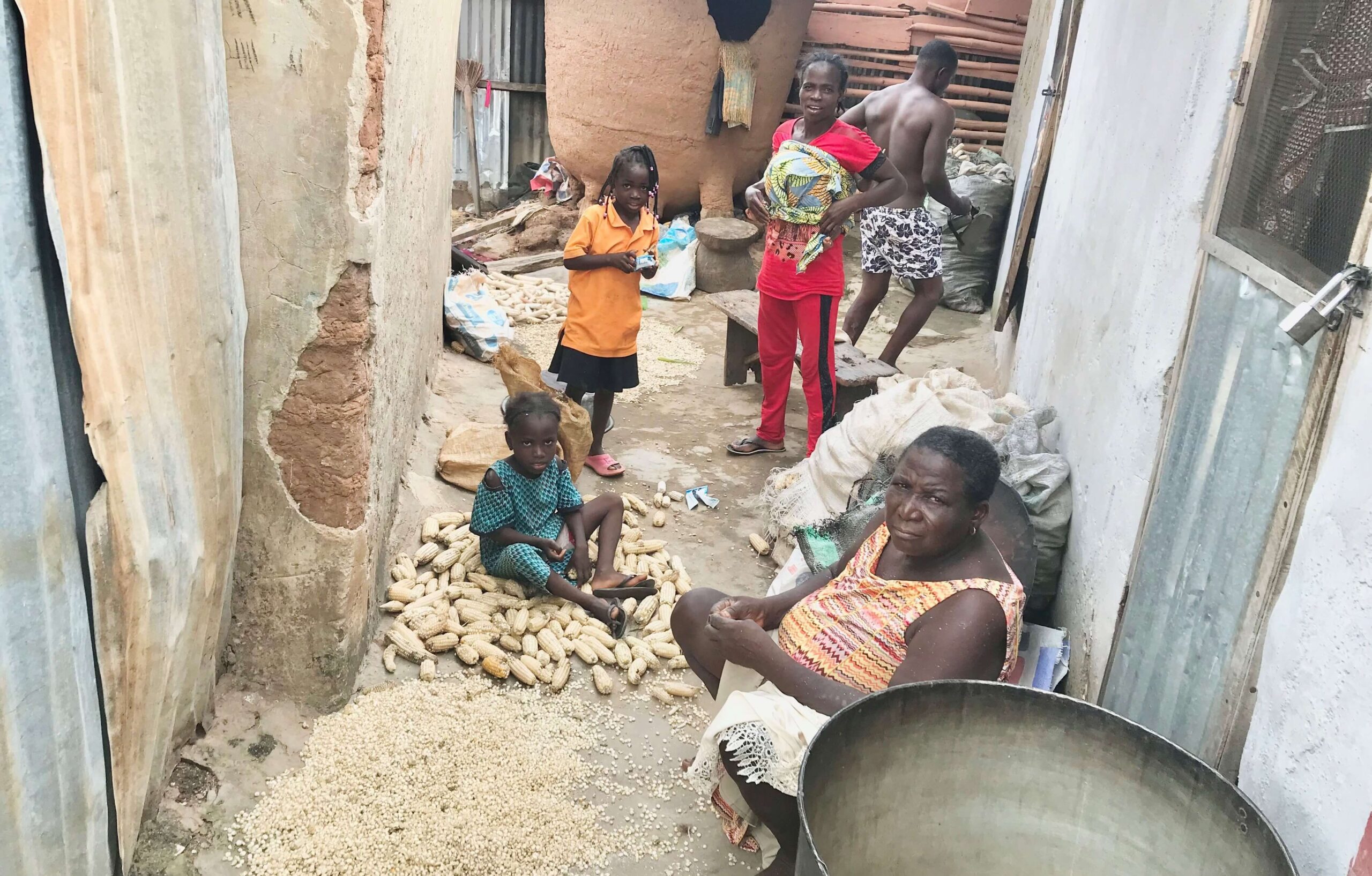It was a sunny Saturday in Anguwan Gwari, an indigenous community of the Gbagyi people of Abuja, and Tenni Gajere had just woken up from her siesta. With the help of her son, she walked down to a small, shaded area outside her house to meet and converse with this Prime Progress reporter because the house felt stuffy.
“I am now accustomed to being interviewed. For years, several government officials have come to ask me questions and even take my passport. Although none of these encounters has changed my life, I jokingly refer to myself as a professional interviewee,” she humoured.
The 70-year-old is mostly confined to the walls of her home because she can hardly walk on her own. She stays indoors and does what little she can to help around the house.
“I started facing this problem two years ago when I woke up and couldn’t walk well. Before then, I used to be a dedicated farmer, mother, and important community member,” she said.
Gajere used to be an assistant to the chief of the community, known as “Magajiyan sarki.” During her time, she oversaw all the women in the community and relayed relevant information from the chief to women and children.
However, this is now just a trip down memory lane, as she must confront a harsh reality today. Her 27-year-old son, Sunday, has to live with an ailment that will limit him for the rest of his life.
“As if not being able to walk well wasn’t enough, my son suddenly fell ill, and he couldn’t walk either. His left leg began to swell, and we rushed him to the hospital, but nothing was found. We consulted local doctors, but nothing changed. It’s still the same,” she said, turning leftward to look at Sunday.
Gajere explained that, as an elderly community member, she has witnessed how the government built a healthcare facility for them that does not serve them effectively.
“We have one hospital here. It’s disorganized and lacks many specialists. When my son’s illness began, I took him there, and they said they couldn’t do anything about it. Now my son suffers every day, and we don’t have the money to take him to an expensive hospital,” she lamented.
Gajere told Prime Progress that she has had to live with her own problems, and her son has little or no hope for the future, especially for Sunday.
Pace reduced, but hope alive
Everyone around can only assume how much pain Sunday is going through, but he alone knows and can quantify it.
“Life has always been difficult for us in this community. All we’ve done as responsible people is look for ways to sustain ourselves. Since I didn’t attend university, I learned and became a professional plumber. It paid off well but was cut short at a very delicate stage,” Sunday said.
As a hardworking plumber, Sunday had already caught the attention of prominent individuals who paid him well and referred him to other customers.
“Before 2021, I was invited to several houses to install and fix pipes. I started building a network of people who trusted me with their homes and others who were willing to support me in securing larger contracts. It’s just sad how all of this has come to an end for me now,” he said with an aura of pain.
Sunday explained that his ailment began with mental ineptness. He became uncontrollable until he was taken to the community’s healthcare facility for treatment.
“I suddenly went mentally retarded for a few weeks before my leg started swelling. The hospital said they could not help me because they didn’t see anything [cause]. Despite all they have said, I believe that if I am taken to a better place, there will be a solution for this. But again, we do not have the means,” he added.
Sunday and his frail mother live with the youngest male child in the family, who is left with the daily struggle of providing for their basic needs. His younger brother has aspirations and dreams, but all of that is now out of reach as he has to confront this harsh reality.
“Our father passed away when we were children, and our sisters later got married and moved to their husbands’ homes. They would have helped, but they are also facing significant challenges. My younger brother is the sole breadwinner, farming and taking on other menial jobs to provide for the family,” he shared with Prime Progress.
Life is especially challenging for the Gajeres because other people, including some extended family members, have abandoned them. They believe that all the misfortunes they are experiencing are their fault, so they are left to suffer on their own with very little concern from those around them.
From a not-so-distant point of view
Monday Ishaya, a concerned cousin, informed Prime Progress that the community has one healthcare facility and three schools, which should theoretically be sufficient for the people. However, the hospital in the area has proven to be only partially useful.
“I understand that compared to other indigenous communities, we have limited facilities, but currently, they don’t serve us well,” Ishaya emphasized.
He went on to explain that his cousin nearly lost his life when he experienced a mental breakdown, and all the hospital staff could say was that he was possessed. When his leg swelled up, they still couldn’t determine the cause, and they gradually distanced themselves from their family.
Ishaya also emphasized the need for the hospital in Anguwan Gwari to have young, qualified, and agile staff who can effectively handle patients and make referrals to other hospitals if necessary. According to him, the current staff at the hospital does not meet the standards of a medical facility.
Meanwhile, Sunday remains with his swollen leg, alongside his ailing mother, holding onto the hope that things will improve someday.
“I had so many aspirations for 2022, but they were shattered. Nevertheless, I am thankful to God that I am still alive. I firmly believe that I will eventually recover, and I also have faith that through this storytelling, kind-hearted people will reach out to us, provide assistance, and help us escape the current ordeal we are enduring,” Sunday said.
Behind the closed curtains of community stories lie numerous untold and underreported narratives. This is one such story that should be brought to light and acted upon, raising awareness of the government’s responsibilities and placing a burden on journalists to continue advocating for impactful storytelling.
Tenni Gajere, a 70-year-old former community leader in the Gbagyi community of Abuja, now struggles with mobility issues and reflects on her past as an active woman. She and her son, Sunday, face severe health challenges with insufficient medical care available in their local healthcare facility. Sunday, formerly a successful plumber, is now incapacitated due to a mysterious ailment that began with a mental episode and led to swelling in his leg. The local hospital's lack of resources and specialized staff means they cannot provide adequate treatment. The family, burdened by these health issues and financial constraints, is supported by Sunday’s younger brother, who works hard to meet their basic needs. Overall, the Gajere family's struggles highlight larger systemic issues in healthcare access and community support in Anguwan Gwari.
Monday Ishaya, a concerned cousin, underscores the inadequacy of local healthcare facilities, calling for better-trained and more agile medical staff. Despite their hardships, the Gajeres hope for improved circumstances and assistance from external benefactors. This story emphasizes the need for raising awareness about the plight of underreported communities and advocating for their betterment through impactful storytelling.






